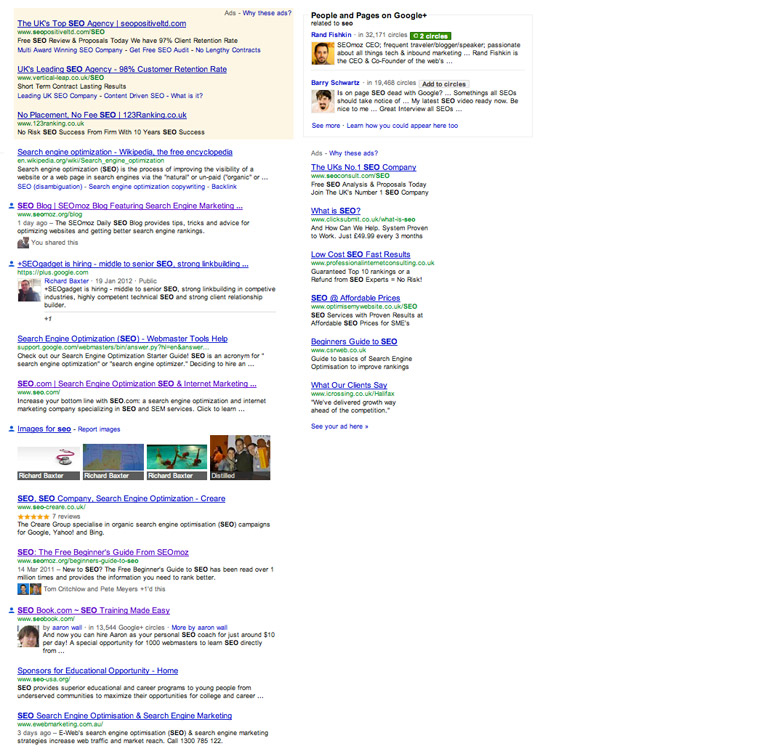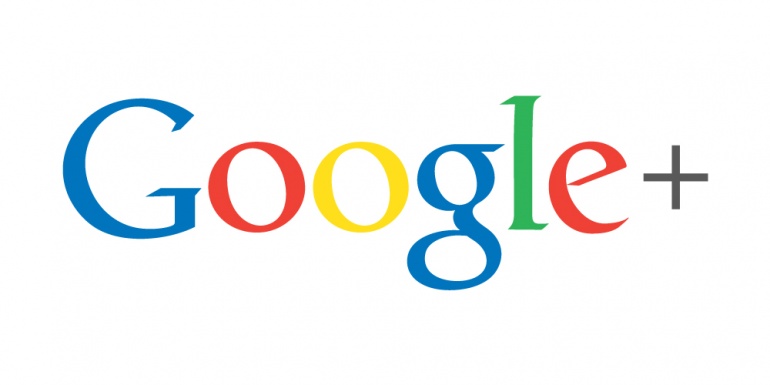Setting the Scene
To say that Google is changing the way we do SEO is a ridiculous statement to make. Not least because much of the reason SEO became a widely implemented marketing tactic is because Google was making ranking on its search engine a necessity for all types of business. Having said this, recent developments at Google (many SEOs would agree) have really changed the way the task of SEO should be approached. The developments that I speak of have names; Google+ and Search Plus Your World (SPYW). You have probably already heard of Google+ but if you haven’t it is essentially Facebook mixed with a little Twitter (you can have followers) and some nice animation style effects. I can hear social media experts spilling their cocktails as I write this. Early this year Google also launched SPYW A basic description is that when you are logged into Google (Gmail, Google+ or any other tool made by Google) they will, by default, invade your search results with social stuff. The key piece of information to take on board here is that by ‘social stuff’ I mean stuff from Google+.
What Can it Do?
Change your search results...
What can it do…what can’t it do more like; well it can’t show you search results based on your Facebook or Twitter account, keep this in mind. The significant thing about SPYW is that it will change the search results you see quite dramatically from when you are logged in to when you are logged out. Take a look at the screenshots below:
Logged out of Google:

Logged into Google:

The only difference between these two search results is that one was taken when I was logged out of Google (top) and the other when I was logged in (bottom). They were taken at the same time on the same day for the same keyword (‘SEO’). The difference comes from Google using the data it collects from your Google account, or more specifically your Google+ account. They can see who you follow, what websites and posts you +1 (this is ‘like’ in Facebook speak) and what you look at. Using data like this Google are able to serve up personalised results (highlighted with a little blue person) that they think will interest you.
In the example I have pictured take a look at the third organic result for the logged in search. It is a fine specimen; it has a mug-shot, some text and is about an SEO expert who I respect. Just by being logged into Google, the Google profile of Richard Baxter has completely usurped the ranking position of SEO.com (a domain name that in days gone by would have had its cake and eaten it). The implications of this are obvious; get a meaningful relationship going with your customers and you can expect magnificent search results.
Get you into the circle of trust...
This is an idea that I must give credit to Mat Clayton for. In a lecture delivered by Clayton as part of a series put together by Distilled, the idea of the circle of trust was raised and its importance in the realms of social media and search was enforced. Take a look at the diagram below, which describes where different types of interaction sit within a person’s relationship structure.

At the top right is the important part; your friends and family. These are the people who most influence you and your decisions. These are the people that you trust and this is where the circle of trust is. Now take a look at the bottom left of the diagram, this is where brands and companies go; they are formal relationships and often don’t last long. Sometimes they can last a long time but remain formal. This leaves brands with a dilemma; in order to become an important part of a customer’s life they need to become trusted. Many would say this is the reason why social media has become such an integral part of marketing: because it allows brands to penetrate the circle of trust. This matters when it comes back to Google’s SPYW because suddenly your search results are cluttered with pictures of people you know, next to brands that they have interacted with. Upon seeing a picture of your mum next to a link for a supermarket that she recommended you immediately send a hook out from your circle of trust and give the supermarket some gold dust flavoured trust. Current valuations set this illusive liquor somewhere between very valuable and extremely very valuable. Need I elaborate further? Also worth mentioning here is that SPYW relies heavily on social proof. This is something thatI have written about previously but it essentially means that if your friends publicly like something, you are more likely to approve of it as well.
Let you make use of Google's better SEO...
This is a point that came to my attention thanks to a great post by Cyrus Shepard at SEOmoz. Google aren’t just classified as good at SEO because they are Google but because their social network does SEO so much better than Facebook and Twitter. Amongst the things that Google do right, in the eyes of an SEO is the fact that when you compare the average Google+ profile to a Facebook and Twitter profile you often find that the Google+ page has significantly more indexible content (ie. text). Google+ also tends to have more relevant and descriptive page title elements than its rival social networks. Another benefit is that content is shared to the public by default. Compare this to Facebook who default to locking down content. These features of Google+ mean that it is no wonder that Google+ content ranks so highly. The lesson to take away here is that you should be making use of this ability to rank right now!
What do you need to do?
Get a Google+ account / profile
Step one is a no brainer; sign up for Google+ and set up your profile. We all know that managing a new social network and the connections that come with it can be a time consuming monster but that is the the only way I am afraid. Get your profile up to scratch and get involved, use your Facebook and Twitter accounts to let people know you are on Google+ and soon enough you will find your feet.
Set up a Google+ page for your company
Another obvious one here; set up a Google+ business page. As with all public facing parts of a company you should consider what you want to achieve with you social media efforts. Keep it simple and stay on message but for the sake of SEO it has now become too risky to not get involved in social media channels.
Create and share good content
This one is not an SEO secret – if you create good content that people genuinely want to read about then chances are you will do pretty well online. This is really the name of the game when it comes to running your Google+ account, it is certainly a tactic that wont do you any harm anyway. I have nothing else to say on this point really other than you will know what is good content, because you most likely read good content yourself already.
Interact with the people around you
As I pointed out earlier on in this post, the more connections you have on Google+ the more chance you have of getting your face (or logo) into their search results. This leads to an obvious conclusion; get lots of followers. Be aware that to make any real impact you must make sure that the people you do end up influencing are people that will actually be interested in what you are doing.
Conclusion
Coming up with a healthy strategy to harness the new found power of Google+ is essential. Although getting a Google profile is not going to change the fortunes of a rubbish website, put into the right hands a Google+ profile could be the extra search engine boost that your business needs to harness a completely new audience. Ignore this social SEO revolution at your peril.





